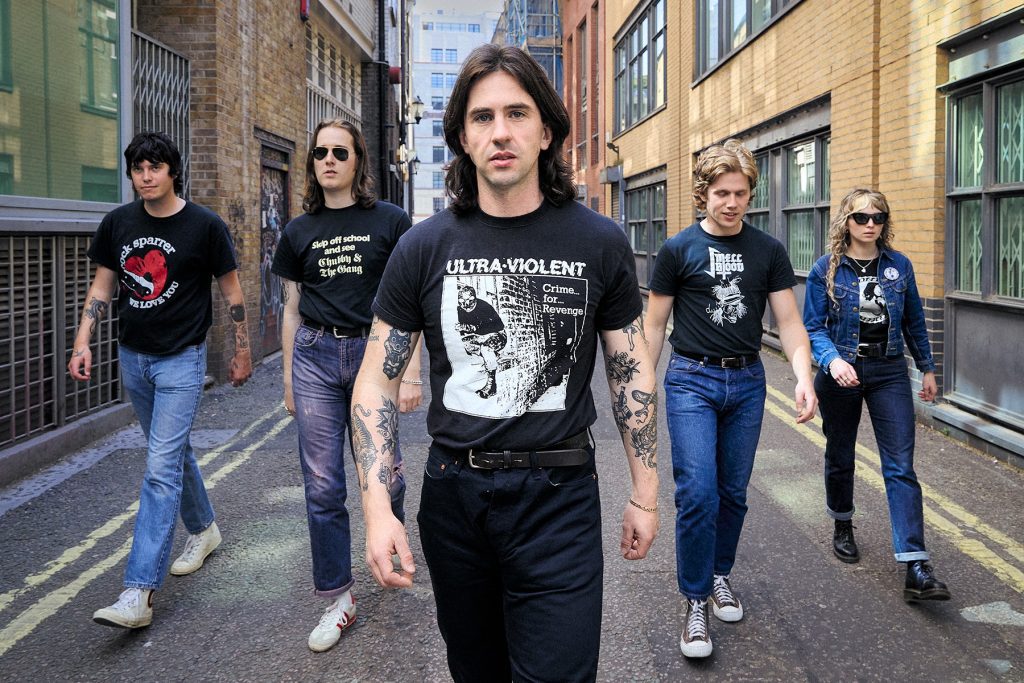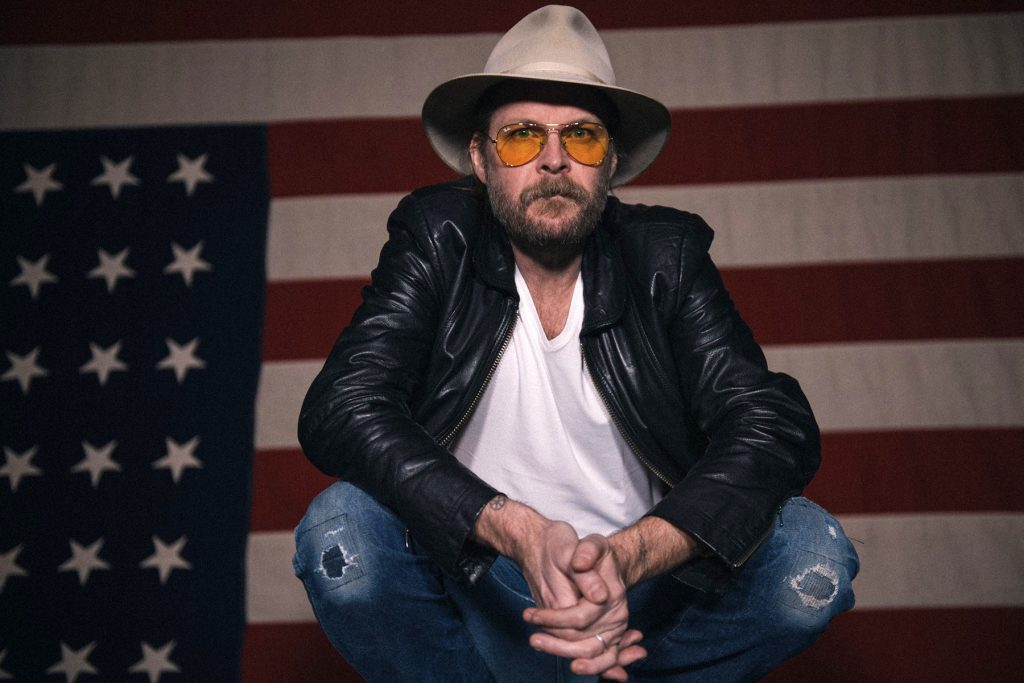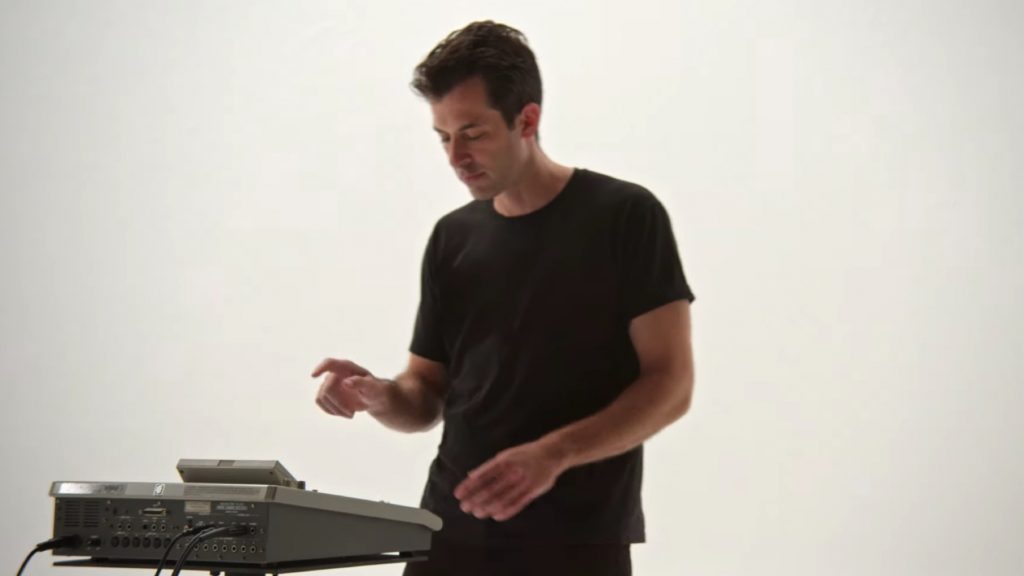
Chubby and the Gang’s Radical Rock & Roll Kicks

Charlie “Chubby” Manning Walker learned to play guitar after being hit by a car. He was 15 when the car popped the pavement, slammed into him from behind, and left him with a broken arm and shoulder. Confined to a bed for a couple months, there was little he could do. But he somehow had just enough range of motion left to hold a guitar, make chord shapes, and strum. “Fuck,” he figured, “I’m just gonna practice guitar.”
Some 15 years later, Manning Walker found himself confined again, this time to his London flat during the first Covid-19 lockdown in the U.K. The band he fronts, Chubby and the Gang, had released their debut, Speed Kills, in January 2020 on the local punk label Static Shock Records; there was good chatter at home and abroad, the kind you could spend a full year touring off of, until that became impossible. Not all momentum was lost — the band signed a new deal with Partisan Records, home of Idles and Fontaines D.C., last spring — but Manning Walker, who’d spent well over a decade touring in bands from London’s punk and hardcore scene, was now holed up at home unable to do any of that. He couldn’t even fall back on his day job as a union electrician on film sets.
blogherads.adq.push(function () {
blogherads
.defineSlot( ‘medrec’, ‘gpt-dsk-tab-article-inbody1-uid0’ )
.setTargeting( ‘pos’, [“mid-article”,”mid”,”in-article1″,”mid-article1″] )
.setSubAdUnitPath(“music//article//inbody1”)
.addSize([[300,250],[620,350],[2,2],[3,3],[2,4],[4,2]])
;
});
“I had six weeks to just fucking… I don’t know,” the singer, 30, remembers on a recent Zoom call. “I was lost for six weeks — like, ‘What am I gonna do?’”
The answer was obvious when it came along: “Fuck,” he figured, “I’ll write some songs.”

Direct, demonstrative, restless, reckless, and wry — that’s what Manning Walker is, and that’s the kind of music Chubby and the Gang make. Speed Kills melded his deep punk and hardcore roots with a love of early rock & roll. The guitars grooved like buzzsaw teeth, the drums beat down in swinging blows, and Manning Walker roared tales of street brawls, speed binges, crooked cops, and systemic rot. The songs on the band’s second album, The Mutt’s Nuts, out August 27th, hit just as hard, but with a far more expansive sound that bolsters Manning Walker’s dispatches on work, heartbreak, racism, inequality, and the grace and grit of London.
“Speed Kills was like 2,000 mile-per-hour rock & roll, one ballad, one acoustic song,” says Jonah Falco, the drummer for Toronto hardcore heroes Fucked Up, who now lives in London and produced both Chubby albums. “The Mutt’s Nuts, there’s four or five stations of total musical relief. It’s like these rolling hills of taste, and it’s really great to see that flow going through.”
Though Chubby and the Gang demoed, developed, and fine-tuned The Mutt’s Nuts over several months, the songs still feel tied to Manning Walker’s flat. There’s a pervasive sense of being trapped — trapped in dead-end jobs, in an unfair criminal justice system, by longing, depression, and expectation, the illusion of meritocracy, and circumstances beyond one’s control that those in power have determined will seal your fate anyway.
On early single “Lightning Don’t Strike Twice,” Manning Walker fumes at the inequality of opportunity, capturing the way so many are screwed no matter what they do by mixing his metaphors: “They say lightning don’t strike twice/But these still feel like loaded dice.” “Coming Up Tough” takes aim at the carceral state’s lack of interest in rehabilitation, inspired by a family member who, at a young age, got into a fight that went wrong, then spent 20 years in prison and re-entered a world that wanted nothing to do with him: “How can you prove them wrong/If no one even gives you a chance?” On “It’s Me Who’ll Pay,” one of a couple of anthems for this era of stagnant wages and crushing productivity demands, Manning Walker bellows what could be a Chubby and the Gang thesis statement: “Sell my soul to the fucking job? No way/If time is money then it’s me who’ll pay/And all the coppers and politicians keep it all in place.”
“Maybe I felt like the world was closing in,” Manning Walker says. “We’d just had Brexit — can’t leave an island now. Can’t leave my room because there’s Covid. It just felt like the world’s shrinking and I got a lot of time to reflect on things I don’t like, so I expressed my dismay by writing songs about that.”
blogherads.adq.push(function () {
blogherads
.defineSlot( ‘medrec’, ‘gpt-dsk-tab-article-inbody2-uid1’ )
.setTargeting( ‘pos’, [“mid-article2″,”mid”,”in-article2″,”mid-article”] )
.setSubAdUnitPath(“music//article//inbody2”)
.addSize([[300,250],[300,251],[620,350],[2,4],[4,2],[3,3]])
.setLazyLoadMultiplier(2)
;
});
If rock & roll is good for anything, it’s detonating futility with sound and digging up a feeling of possibility from the wreckage. Chubby and the Gang, just two albums in and barely two years old, are already a crack demolition and excavation crew. Manning Walker built the Gang with musicians from his community: He and Tom “Razor” Hardwick played together in the hardcore band Violent Reaction; Meg Brooks Mills, who joined last year, was a bass shredder around London; guitarist Joe McMahon and drummer Ethan Stahl came out of the hardcore scene in Brighton, an hour’s drive away. All were seasoned musicians in their own right, and they made it feel like Chubby and the Gang arrived on this Earth fully formed as a band. Speed Kills does not betray the fact that it was recorded in two days, only months after Chubby and the Gang played their first show (Mills’ predecessor, Luke Austin, was on bass). Unable to spend much time cutting their teeth live due to the pandemic, they stayed sharp last year by practicing and, by Falco’s count, doing three rounds of demos over six months before recording The Mutt’s Nuts.
Falco remains proud of Speed Kills, but credits the work Chubby and the Gang put in with transforming the band into “so much more than even just a catalyst for [Manning Walker’s] ideas — they are their own force.” The crux of their sound remains hard and fast rock & roll, but versatility is in their DNA. “Pressure” is a pitch-perfect pastiche of Manning Walker’s beloved Mötorhead; “Life on the Bayou” lifts some New Orleans boogie for an ode to the deindustrialized docks of Brentford; and closer “I Hate the Radio” is one of the best songs Nick Lowe never wrote.
“When you start off in a subculture, you want to emulate everything, and then the more time you spend in that subculture, the more you try and push the boundaries,” Manning Walker says. “I spent 15 years doing punk music. I can’t shake it off, so anything I do that sounds like Buddy Holly is gonna sound like Buddy Holly as if he was a punk. I just make music that I like, and if they like it, they like it, and if they don’t, well… I’ll be in exactly the same position as I was before.”
When Manning Walker was growing up, his parents filled the house with Studio One reggae records and bands like the Ramones. By the time he was a teen, he was already sporting “charged hair and a fucking sleeveless jacket.” Even with such a punk-friendly upbringing, there was a need to rebel, and Manning Walker found his outlet one day while walking through Camden: a flier for a hardcore show.
“I went in, I saw these people jumping on each other, the tempo was up here, and I was just like, ‘This is it,’” he says. “I’m sure thousands of people have the same thing, where they just kind of stumble on something.” (The artist Spoiler, who would go on to design the memorable, R. Crumb-esque covers for Speed Kills and Mutt’s Nuts, was, coincidentally, playing in a band that night.)
blogherads.adq.push(function () {
blogherads
.defineSlot( ‘medrec’, ‘gpt-dsk-tab-inbodyX-uid2’ )
.setTargeting( ‘pos’, [“mid”,”mid-articleX”,”in-articleX”,”mid-article”] )
.setSubAdUnitPath(“music//article//inbodyX”)
.addSize([[300,250],[300,251],[3,3],[620,350]])
.setLazyLoadMultiplier(2)
;
});
Manning Walker became a fixture in this hardcore scene, which centered loosely around labels like Static Shock and La Vida Es Un Mus Records. He played in, toured with, and helped out with songwriting for a litany of groups — Violent Reaction, Arms Race, Abolition, Crown Court — but Chubby and the Gang marked his first time recording tunes that were all his own. “I wanted to show people I could do this,” Manning Walker says.
That desire was almost monomaniacal, the idea of Chubby and the Gang burning bright in his mind long before the band actually existed. Falco remembers the first time Manning Walker told him about Chubby the Gang: The singer had it all planned out, down to the title of the first record.
“Every time we were at the pub, a party, a gig, he’d look over at me and be like, ‘Speed Kills, mate,’” Falco recalls with a laugh. “And then eventually it was, ‘Speed Kills, you’re gonna record it.’”
Manning Walker had honed his instincts as a songwriter over the years, but vocalist was a new role for him. When Chubby and the Gang recorded their first single, “All Along Uxbridge Road” b/w “Moscow,” Manning Walker went to hit the first note and his voice cracked like a teenager’s. Manning Walker admits he’s quick to bin something that doesn’t immediately work, and he credits Falco with keeping him focused and committed to finding his voice.
The songs on Speed Kills were “a level up, sound-wise and writing-wise,” Falco says. “They were fast, they were reckless, but they needed that Charlie howl. The personality of his ideas sometimes was presenting itself larger than what he was projecting as a vocalist. We had to get that up to the same level, and that was the big challenge.”
That howl is deeper and gruffer on The Mutt’s Nuts, but it’s also more dexterous, and there’s a jolt of new melodic confidence when Mills and Hardwick back him up. To Falco’s point, as Manning Walker’s voice gets bigger and more assured, so do his ideas. One of the album’s most ambitious tracks is “White Rags,” a sludgy, sinister march with lyrics written after the murder of George Floyd. “Institution rotten to the core/Treating prison like an abattoir,” Manning Walker sings, voice rough with scorn. “Where are all the singers? They’re quiet, that’s strange/When it comes to talk of real change.”
blogherads.adq.push(function () {
blogherads
.defineSlot( ‘medrec’, ‘gpt-dsk-tab-inbodyX-uid3’ )
.setTargeting( ‘pos’, [“mid”,”mid-articleX”,”in-articleX”,”mid-article”] )
.setSubAdUnitPath(“music//article//inbodyX”)
.addSize([[300,250],[300,251],[3,3],[620,350]])
.setLazyLoadMultiplier(2)
;
});
Manning Walker admits he was initially unsure about weighing in as a white man from the U.K. But he felt that it was important not only to express solidarity with Black Lives Matter, but to respond to those in England who seemed to see police brutality and systemic racism as a largely American problem.
“It wasn’t that long ago that Mark Duggan was killed,” Manning Walker says, mentioning the 29-year-old man who was killed by police in 2011, setting off an uprising in London. “The Independent Police Complaints Commission in the U.K. has a zero percent conviction rate [for murder or manslaughter of a person in police custody]; that’s the body that essentially polices the police. You can’t tell me, straight-faced, there’s no racism in the U.K. within our police system. I wanted to say not only that we’re in solidarity with everyone in America, but you cannot feel like we’re free of guilt.” (At the time of this interview, the last time a U.K. police officer had been successfully prosecuted for the death of a person in custody was 1971; on June 23rd, a police officer in Birmingham was convicted of manslaughter in the death of former professional footballer Dalian Atkinson.)
Manning Walker traces the political fervor of The Mutt’s Nuts to those six weeks of lockdown songwriting, when he could reflect and tease things out instead of tossing off “some drunken tirade about how I don’t like cops or something.” Perhaps more than anything else he writes about, Manning Walker is uncompromisingly clear about his politics. “The world is so politically charged,” he says. “Sometimes you need someone to just fucking tell you, that’s how I feel, unapologetic, bang.”

Chubby and the Gang in London, June 2021.
Owen Harvey for IndieLand
Years ago, on tour with his old band Abolition in Hungary, Manning Walker played a show to a room he describes as half-full of fascists. As he told the 101 Part Time Jobs podcast, he neither wanted to compromise, nor let down the other half of the audience. So Abolition hung up a banner behind them onstage that read “Fuck Fascists,” and, afterwards, spray-painted something similar on a wall outside. The next morning, their photo was plastered on a far-right website and the fear of retribution followed them the rest of the tour. Manning Walker says he’s never had to deal with such elements at home, the once frighteningly robust fascist punk contingent in the U.K. having been largely stamped out by older generations. The U.K.’s far-right now, Manning Walker says, hides more behind “soft nationalism,” insidiously careful to avoid being as overt as what he encountered in Hungary.
blogherads.adq.push(function () {
blogherads
.defineSlot( ‘medrec’, ‘gpt-dsk-tab-inbodyX-uid4’ )
.setTargeting( ‘pos’, [“mid”,”mid-articleX”,”in-articleX”,”mid-article”] )
.setSubAdUnitPath(“music//article//inbodyX”)
.addSize([[300,250],[300,251],[3,3],[620,350]])
.setLazyLoadMultiplier(2)
;
});
“Those guys were wearing swastikas. They weren’t gonna say, ‘No, no, I’m not like that,’” Manning Walker says. “They were like, ‘This is what we are.’ That’s why I’m so blatant. These guys don’t give a fuck, so I’m gonna tell you why I’m pro-trade-union, or why I’m such a fucking lefty. I’m not gonna apologize.”
Work, in particular, feels central to Chubby and the Gang’s politics. The Speed Kills bonus cut “Union Dues” is characteristically direct — “Union rock, union roll/Keep scabs on the dole!” — and on The Mutt’s Nuts highlights like “On the Meter” and “Beat the Drum,” Manning Walker tells vivid stories about the moonlit charms and dark alley dangers that defined his time as a minicab driver in London. He can also go in on the never-ending exploitation and degradation of the working class: On “Overachiever,” a dizzying hit of Chubby and the Gang’s more madcap side, Manning Walker twists glue-sniffing à la the Ramones from an act of boredom into a better use of one’s time than working to death for an exploitative boss.
In this way, Chubby and the Gang are an important reminder that rock & roll — despite decades of bloat and excess — is rooted in music made for working people, by working people. The band’s music feels in tune with an inflection point for labor movements everywhere, including the music business, where the pandemic has spurred organizing efforts from the National Independent Venue Association to the Union of Musicians and Allied Workers to the employees of the indie label company Secretly Group. Manning Walker, for his part, just started paying dues to the Musician’s Union in the U.K., but he’s quick to note he’s never viewed his music as a job, let alone a career: “If I was trying to make some money, the last thing I’d jump into is music. I’m definitely going to put in the work, but that’s because I love to do it. It makes things in this world bearable, so fuck it, let’s do it.”
It’s a rational view. The vast majority of artists make a fraction-of-a-fraction of a cent each time their songs are streamed, and the “cost of entry” for bands in cities like London remains on the rise. Manning Walker notes that practice space rates in London are up to £50 for a couple hours, while venues, clubs, squats, and DIY spaces have been totaled by gentrification, to say nothing of the still unknown toll of the pandemic: “If I was a kid in London and I was into punk music, it’s like, how could you afford this shit?”
As assertive, assured, and bold as Manning Walker is, these aren’t the qualities that make Chubby and the Gang a great band. “Despite the bravado, there is a lot of humility there,” Falco says. “That might sound laughable, but there’s a subtle humility that evades other rock & roll acts.”
blogherads.adq.push(function () {
blogherads
.defineSlot( ‘medrec’, ‘gpt-dsk-tab-inbodyX-uid5’ )
.setTargeting( ‘pos’, [“mid”,”mid-articleX”,”in-articleX”,”mid-article”] )
.setSubAdUnitPath(“music//article//inbodyX”)
.addSize([[300,250],[300,251],[3,3],[620,350]])
.setLazyLoadMultiplier(2)
;
});
There’s humility in Manning Walker’s politics: an understanding of power, what the individual can achieve and what’s more possible with the whole gang behind you. But there’s also a humility in the way Chubby and the Gang approach rock & roll’s most innate pleasures. As serious as the content can get, it’s always balanced by a rough and tumble energy, a cheeky swagger, and a sense of fun. “Trouble always follows me,” Manning Walker belts on “The Mutt’s Nuts,” “But there’s no place I’d rather be.”
“Every two or three years, you’ll get this band that’s ‘reinvented hardcore,’ ‘reinvented punk music,’ and it’s like… fucking hell, how many times can you reinvent something?” Manning Walker cracks. “It’s not even broke, why do you need to reinvent it? Sometimes you just want to hear some rock & roll. Sometimes you want to go to an art gallery to see some abstract painting that really makes you think, and sometimes you want to see a picture of a guy on a horse. And I feel like we’re just that. This isn’t some abstract, make-you-think, whoa-I’ve-fucking-had-an-epiphany. It’s just a fucking cold pint on a Sunday, which is nice!”




